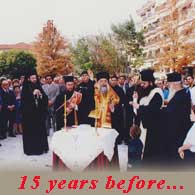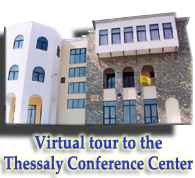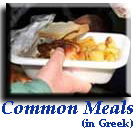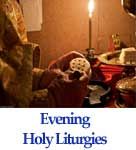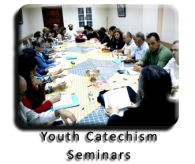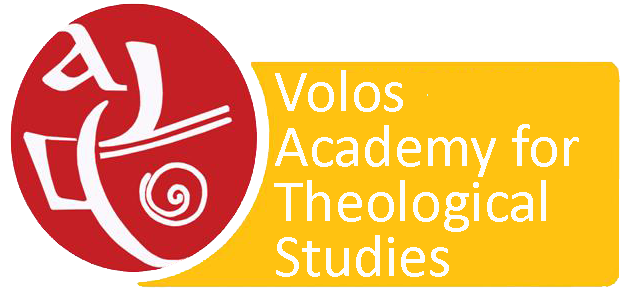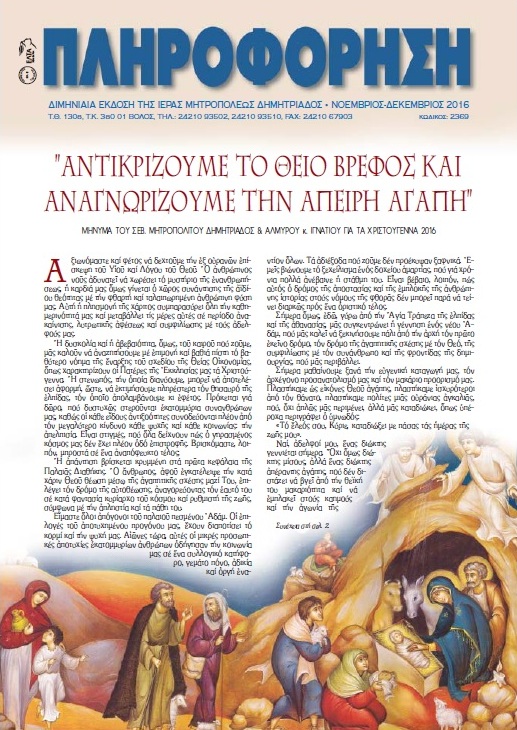Press Release of International Conference 2014
On 8th to 11th of May an International Conference was successfully held in Volos, Greece, organized by Volos Academy for Theological Studies on the general theme: "Orthodox Canonical Tradition and contemporary challenges." At the beginning of the conference the Director of Volos Academy Dr. Pantelis Kalaitzidis (click here), the Metropolitan Ignatius of Demetrias (click here), addressed the meeting, highlighting the importance of the topic, while Metropolitan John Zizioulas of Pergamon (click here) read on behalf of his Holiness the Ecumenical Patriarch Bartholomew I, an official letter of greetings to the conference.
In the session of the first day, chaired by the Director of Volos Academy Dr. Pantelis Kalaitzidis, Rev. Dr. Grigorios Papathomas, (click here) (Professor of Canon Law, Faculty of Theology, Athens University and St. Sergius Orthodox Theological Institute, President of the European Forum of Orthodox Schools of Theology, Member of the Board of Directors, Volos Academy for Theological Studies) presented the topic "Ηistorical Context of Canons' Genesis and Theology of the Holy Canons". According to the speaker the being of the Church is both historical and eschatological. Because of this dual mode of existence, the Church is called to express and address contemporary historical events which concern humanity, both through an eschatological orientation (liturgy) and the ontological signposts (Holy Canons), aiming the unity of the difference between the human - historical and eschatological way of being. Here lies the fact of the Canons' genesis, and of the dialectical relationship between the historical context and the eschatological theology in the Holy Canons. In this case, the Canons, except timelessness, are characterized by synchronicity, by the local and historical characteristics of the time, in which they have been issued. The study of the Canons should not be exhausted in their text, because, otherwise, one would lose the sense of the empirical reality which is expressed as a deduction in it. The study of the Canons is normally completed by their hermeneutics. Finally the modern demand of the abolition or modification of the canons and the various attitudes and objections towards the sacred canons, is founded upon the mutations of the canonical tradition of the Church during the second millennium. Our approach is twofold against the Canons of the three stages of the Canons' genesis: Interpretation and renewal in the sense of the empirical hermeneutical update of the canons both in the perspective of the interpretation and renewal, done by the Church, as the only authentic interpreter of the Canons, as well as in the perspective of adopting them as signals of the Eschaton. The second speaker Dr. Spyridon Troianos, (click here) (Professor Emeritus, Law School, Athens University), presented the topic "The Principle of "Economy" in Orthodox Tradition Now and Then". According to the speaker the influence of Christian teaching on the Roman law is often highlighted within the history of Law. However one could not ignore the reverse direction, i.e. the influence of Roman law in the formulation of ecclesiastical institutions, since the Church was organized, following the standards of its legal environment. The concept of aequitas (= equality), appears quite early within the Roman law, based on the Aristotelian επιείκεια. Aequitas is a method of approaching the law, in which the condescension plays an important role, although not as a reckless deviation from the established juridical tradition, but as a concrete expression of the idea of justice. Meantime, after the lawyers of the classical period had understood the possibility of a difference between the strict law and aequitas, the latter became an interpretive tool. From a practical point of view aequitas dictated the issuing of similar decisions in order to address similar cases. There were also cases in which the sense of the law dictated divergence from the current law. In order to define both methods of describing the law, in the field of ecclesiastical law the term "economy" was used. The noun "economy", originated from the Greek verb «οικονομώ», has many meanings. The concept of "economy" was from the beginning similarly understood within the Church. The economy appears within the text of the canons of all the Councils, both Ecumenical and Local, however, the field on which it was strictly practiced, was the celebration of the sacraments and the recognition of their validity, especially concerning the permission, in terms of Canon Law, of the priest to celebrate.
In the first morning session of the second day (May, 9th) chaired by Konstantinos Kornarakis (Associate Professor, Faculty of Theology, Athens University), Dr. Christos Karakolis, (click here) (Associate Professor, Faculty of Theology, Athens University, Member of the Board of Directors, Volos Academy for Theological Studies), spoke on the topic "Bible and Holy Canons." In this paper an attempt was made to examine firstly the stance of Christ against the commandments of the Mosaic Law, according to the testimony of the synoptic Gospels: On the one hand, Jesus Christ does not cease to follow as a Jewish the legal commandments, and on the other hand he presents as the absolute criterion of the compliance with them, the commandment of love for God and one's neighbor. The apostle Paul conceives the Decalogue as the very foundation of his moral teaching. At the same time, however he does not hesitate to remove from the law any sort of soteriological significance, limiting thus its function in the level of Christian pedagogy. The Christian ethics of love, which Paul preaches, goes beyond and abolishes substantially the juridical ethics. The liberation of man from the "curse of the law" is a result of the Christ event. The Gospel of John is the most "antinomic" text of the New Testament. The principal commandment of Christ to his disciples is to believe in him and love each other. Faith and love render unnecessary any individual moral teaching. In the fourth gospel law has a single feasibility, to refer to Jesus Christ and the eternal life that stems from him. The paper concluded with some reflections on the origin and the development of the canons in parallel to the reduction of the enthusiastic nature of the church life or as a result of this reduction. In the light of the biblical testimony, a critical evaluation of this normal development was suggested, the first signs of which are already detectable in biblical texts. Rev. Dr. Demetrios Bathrellos, (click here) (Lecturer at the Hellenic Open University, Visiting Professor at the Institute of Orthodox Christian Studies, Member of the Board of Directors, Volos Academy for Theological Studies) presented the topic "Dogmatic Theology and Holy Canons". The canons are the expression and application of the doctrine of the Church in its very life. In this paper an attempt was made to point out some fundamental theological principles governing the canons of the Church and the necessary criteria for the selection, renewal, systematization, interpretation, etc. of the canons. Dr. Stavros Yangazoglou, (click here) (Advisor at the Ministry of Education and Religious Affairs, Director of the Journal "Theologia," Lecturer at the Hellenic Open University) presented a paper on "Eucharistic Ecclesiology and Canonical Tradition". In this paper an attempt was made to present the Eucharistic and ecclesiological background of the canonical tradition. The canons stem from the Eucharistic community and established by the Church in order to ensure the unity, the order and the peace, but also the implementation of the pastoral work within the indissoluble relationship between Eucharist, doctrine and ethos. Then, the paper explored the different understanding of Eucharistic ecclesiology by Fr Nicholas Afanasief and Metropolitan of Pergamon John Zizioulas, particularly as regards its relationship to the Canon Law. It was also highlighted the pneumatological factor concerning the conciliar acceptance but also the pastoral and therapeutic application of the canons. It is true that the legal spirit and the self-determination of the canons in the context of their Eucharistic foundation and function, can often lead to the emergence of various tensions between institution and charisma or even of fundamentalist extremism. Beyond possible historical and not always ecclesiological effects on the morphology of the canons, the Church could proceed to a renewal of the canonical tradition, by changing both the historical and morphological problem of the canons or applying with distinction the principle of accuracy and economy. It is necessary nowadays the pastoral application of the canons and generally the canon law as a particular scientific theological branch, to be reconnected with the Eucharistic ecclesiology and generally its theological, ecclesiological and pastoral pre-conditions. In the second morning session, chaired by Metropolitan Alexandros of Nigeria, Dr. Theodoros Yangou, (click here) (President at the Faculty of Pastoral and Social Theology, Aristotle University of Thessaloniki), spoke on "Authentic and Distorted within the Orthodox Canonical Tradition." The dialectic between the genuine and illegitimate, in what is contained in the corpus of canons and what subsequently introduced by the church and sometimes by private initiative and testified and emerged in many canonical sources of 11th and 12th century, has been maintained in the manuscript tradition with an obvious tendency of introducing the so-called inauthentic canonical tradition, implicitly and mostly without protest and often at the expense of the official corpus of the canons. The number of the various rescued manuscript collections is a witness of the broad acceptance of the texts of this inauthentic canonical tradition, which attributed to alleged authors, primarily like the patriarchs John the Nesteutes (Jejunator) and Nicephorus the Confessor, which was produced in many cases and incorporated uncontrollably into the canonical collections. David Heith-Stade, (click here) (PhD cand., University of Lund, Sweden), presented a paper on the topic "Is there a "Consensus Canonum"? This paper explored the quest for a consensus canonum (συμφωνία τῶν κανόνων), and examined in what ways we can theoretically speak of a consensus canonum and used historical examples to examine what we actually mean with the consensus canonum. Rev. Dr. Adamantios Avgoustidis, (click here) (Associate Professor, Faculty of Theology, Athens University) presented a paper on "The Pastoral Nature of the Holy Canons". The answer to the question about the pastoral nature of the Holy Canons requires a clarification on how we understand Pastoral Theology and by extension the modern Pastoral Act. In other words, the exploration of the modern "epistemological problem" of Pastoral Theology comes first. The first part of the pastoral epistemological problem, and by extension of the distortion of the pastoral nature of the Holy Canons, consists in the unaware prevalence of a legalistic and moralistic understanding of the application of the canons in the pastoral practice. The second part is characterized by the entrapment in an activist and psychologically orientated, Pastoral vision, where the Holy Canons are now treated as of secondary importance, or simply disregarded, since the psychological understanding of the subject and the relief from the troubles of this life seems to acquire the absolute priority. From the orthodox standpoint the measure and the ethos that ensure the understanding of the pastoral nature and the proper pastoral use of the Holy Canons, is summarized in the Canon 102 of the Quinisext Council (in Trullo). The real question is related to the responsibility in formulating and shaping an Orthodox Pastoral Theology within the framework of the Orthodox Theological Studies, being aware of its ecclesiological and doctrinal standards and knowledge about its true identity and what risks losing. In the first evening session, chaired by Teva Regule, MTh. Dr. Michel Stavrou, (click here) (Professor at St. Sergius Orthodox Theological Institute, Paris), spoke on "Canons and Baptism of the Heterodox". If the question of the recognition of the baptism of heterodox in Orthodoxy comes again to the fore today, without however being definitely settled, is a result of an era that serious disputes took place between Western and Eastern Christians. An attempt is made in this paper to present the reasons why this happens, by studying closely the historical, theological and canonical details. The fundamental canonical norm of Orthodoxy that is related directly to our topic, includes the 95th canon of the Quinisext Council (in Trullo) of 692. However, this canon was not always accepted over the centuries. In the eighteenth century, very severe tensions with the Roman Catholic Church and its "missionaries" - converts in the Ottoman Empire and Transylvania - led to the decision of the Synod of Constantinople in 1755, which influenced through the work of St. Nicodemus of the Holy Mountain, the contemporary position of Modern-Greek sacramental theology. This decision however has been challenged by the ecumenical orthodoxy and is at odds with the ancient tradition. Evidently a Pan-Orthodox reflection on the issue of the recognition of the baptism of heterodox Christian is absolutely necessary, something that would help Orthodoxy to go back to the spirit of the great patristic and Byzantine tradition. Rev. Dr. Alexander Rentel, (click here) (Assistant Professor of Canon Law, St. Vladimir's Orthodox Theological Seminary, New York, U.S.A.) presented a paper on "Canonicity and Ecclesiality of non-Orthodox Churches". In the canonical tradition, groups outside the Church exist in a place that does not allow them to be called Church in the same way that the Church is. These groups are either non-Christian (pagans), or else they have sundered the unity of the Church (parasynagoges or schismatics), or they have chosen another belief (heretics). The canons maintain a strict approach to this principle that contrasts with another perspective on these same groups from within the canonical tradition. This perspective delineates methods of receiving these groups into the Church when they seek entrance into it. Holding these methods of reception together with the unwritten canon that says Baptism is the only entrance into the Church, an unspoken acknowledgement can be inferred that something of the Church exists in those groups that do not require baptism. Furthermore, the canonical and the broader patristic tradition witness to a desire to dialogue with non-Orthodox to carefully ascertain their faith and, when appropriate, seek reconciliation and unity with them. The strictness and this desire, seemingly contradictory, emerge from the fundamental hermeneutic of the canonical tradition, Jesus Christ, who alone provides an understanding of and allows for proper application of the canonical tradition. The paper of Vlassios Feidas, (Professor Emeritus, Faculty of Theology, Athens University, Dean of the Institute of Postgraduate Studies in Orthodox Theology, Orthodox Center of the Ecumenical Patriarchate, Chambésy, Geneva), on the topic "Common Prayer and Ecumenical Dialogue According to the Holy Canons", was read due to his absence, by Rev. Dr. Gregorios Papathomas. The text addressed through a careful examination of the true meaning of the holy canons that deal with issues related to the relationship with the heterodox Christians (e.g. canons, Apostolic 45th and Laodicea 33th) the issue of common prayer in the dialogue for the unity of Christians, proceeding in an ecclesiastical interpretation of the relevant canons. During the last session of the day chaired by Dr. Maria Tatagia, Dr. Georgios Gkavardinas, (click here) (Assistant Professor, Faculty of Theology, Aristotle University of Thessaloniki) presented the topic "Canons and Fasting". Fasting was a common reality in ancient Greece, Egypt and elsewhere. The Jews in accordance with the requirements of the Mosaic Law, were following various fasts. Christianity received the spirit of Jewish fasting and integrated it in the spiritual content of the Christian teaching. During the first Christian centuries the fasts days were mainly Wednesday, Friday and the Great Lent. These fasts, also known as catholic fasts, vary in content and duration of other subsequent fasts introduced gradually, through monastic Ritual, in the life of the Church by the representatives of monasticism, the so-called special fasts. The holy canons determine canonical provisions only for the catholic fasts. Instead, the Synods of Constantinople in 11th century dealt particularly with the special fasts, issued relevant canonical decisions, regulating the duration, power and validity of the special fasts. The issuance of these decisions was caused by the constant challenge to the special fasts by the monks, as well as the clergy and the lay people. The decisions of these synods contributed to the definitive establishment of the special fasts in the life of the Church. Rev. Dr. Avgoustinos Bairaktaris, (click here) (Assistant Professor, University Ecclesiastical Academy of Crete, Member of the Academic Team of Volos Academy for Theological Studies), spoke on "Canons and Environment". In his presentation an attempt was made to reveal the existent relationship between the Holy Canons and the environment. The term environment includes also the concepts of creation in general and of man and all creation in particular. Furthermore, it is appropriate to refer to the modern phenomenon of the ecological crisis as a consequence of the shift from the concept of ministry and environmental management towards the exploitation of creation by man in a selfish and unilateral development. This shift is a consequence of sin, which causes the separation of the human person both from his familiar surroundings, and his relationship with God. In other words, the creation follows the man to his fall. Which and what kind of relationship can exist between the canons and the ecological crisis, as a result of the anthropological crisis? In this perspective the speaker intended to present relevant canons referred to human greed that drives the modern and essentially uncontrolled economic growth at the expense of the natural resources, the insatiable human desire to be in possession of more and more material goods at the expense of the other people, etc. In the first session of the third day (May, 10th), chaired by Rev. Dr. Alexander Rentel, Dr. Nikolaos Maggioros, (click here) (Assistant Professor, Faculty of Theology, Aristotle University of Thessaloniki), spoke on "Questions of Religious Freedom and Diversity within the Church Canons". After defining the meaning of the concept of human rights, he attempted to clarify the nature of the holy canons in relation to the religious policy of the Roman and Byzantine Empire. In this context the holy canons described the relationship between the emperor and the Church. Finally, the speaker presented the attitude of the Roman Catholic Church and the different Orthodox Churches against the modern achievement of the human rights and the religious freedom and the role of the canonical tradition of the Church within the context of the public sphere. The paper of Dora Dimanopoulou-Cohen, (Researcher in the Ecole des Hautes Etudes en Sciences Sociales, Paris), on "The Place of the Jews within the Canons of the Church" was read due to her absence by Aikaterini Pekridou, academic member of Volos Academy. According to St. Paul "Neither Jew nor Greek". At the same time, however the 11th canon of the Quinisext Council (in Trullo) (691) convened by the Emperor Justinian II, stated that Μηδεὶς τῶν ἐν ἱερατικῷ καταλεγομένων τάγματι, ἢ λαϊκός, τὰ παρὰ τῶν Ἰουδαίων ἄζυμα ἐσθιέτω, ἢ τούτοις προσοικειούσθω, ἢ ἐν νόσοις προσκαλείσθω, καὶ ἰατρείας παρ'αὐτῶν λαμβανέτω, ἢ ἐν βαλανείοις τούτοις παντελῶς συλλουέσθω· εἰ δέ τις τοῦτο πράξαι ἐπιχειροίη, εἰ μὲν κληρικὸς εἴη, καθαιρείσθω· εἰ δὲ λαϊκός, ἀφοριζέσθω. What causes this change in the treatment of Jews by the Church, so that this canon prohibits even the medical care and assistance to the Jew? Does this canon reflect the pastoral intention of the Church or the need of the Emperor Justinian to struggle against the emerging Judaic and pagan customs and the ecclesiological differences between the local churches that threatened the unity of the empire? In this study, an attempt will be made to answer the above question, taking into account the 8th Canon of the Seventh Ecumenical Council, which gave the right to Jewish populations, to φανερῶς να εἶναι κατὰ τὴν ἑαυτῶν θρησκείαν. Dr. Rastko Jovic, (click here) (Pedagogical and Catechetical Institute, Belgrade, Serbia), spoke on "Ecclesiastical and Canonical Consequences of the Celebration of Mixed and Disparate Marriages." Inter-church and interreligious marriage stands as a challenge to our theology and our self-conscience. We would rather avoid the discussion on this issue, because it is too painful. In the ever-changing world we have been confronted with living persons having mixed marriages. For that reason we need to approach this issue in order to solve it and find modalities enabling life to flow freely. The Canons of the Church came into being at a time when the Church identified herself with history, and the Empire with the Kingdom of God. Their purpose was to strengthen the historical construction of the Church and the Empire. In such a context, the other was a threat to the historical existence of the Church. On the other hand, eschatology offers a different perspective in seeing the whole world as a Church "in becoming". Mixed marriages pose the questions to us: how do we understand ourselves? How do we understand others? Our tradition has been challenged with new events and new realities, demanding bravery in solving them. In the second morning session chaired by Metropolitan of Ilion Athinagoras, Dr. Radu Preda, (click here) (Associate Professor of the University of Babes-Bolyai, Cluj-Napoca, Romania, Director of the Romanian Institute of Inter-Orthodox, Inter-Confessional, Inter-Religious Studies - INTER, Cluj-Napoca) spoke on "Canonical Tradition and Legalistic Spirit: From the Ethos of Freedom to the Morality of Fear and the Law", where he critiqued the forensic - legal character of the canonical provisions, to the extent that such an understanding is in stark contrast to the evangelical spirit of love and freedom which is considered to be the most suitable way of going beyond all kinds of physical determinations of man. He also stressed inter alia that the canonical tradition stems from the liberating love of the gospel and must be interpreted in accordance to the spirit of Christ, offering to the people a sense of freedom. Dr. Konstantinos Kornarakis, (click here) (Associate Professor, Faculty of Theology, Athens University), presented the topic "Canons and Ethics." Human Personhood and its existential needs seem to be the fundamental criterion in order to understand the theological starting point of the canonical work of the Church. The Church, through its Canons, manifests and interprets in a practical way, the very importance of the Word of the Gospel for the sake of man and its salvation. At the same time she draws on the historical and eschatological dynamic of the Gospel, the necessary criteria in order to educate humanity according to this spirit. In this sense, the authentic foundations of the canon law do not lie in the legalistic understanding of sin (crime-punishment), but in the unveiling of the failure of the spiritual life of the human being. Therefore the Church, through its canons, does not intend to manipulative the ethos of man. Instead of this she would like to help humanity to understand its moving away from the Gospel, suggesting it the proper therapeutic means towards its education in the freedom of the Spirit. Teva Regule, (click here) (MTh, Editor in Chief of the Orthodox Journal St. Nina Quarterly, Teaching at Boston College, Boston, USA), spoke on "Canons of the Church and Women: A Tough Relationship." Although the canons that speak particularly to the lives of women, were promulgated centuries ago, many are routinely used to regulate the ecclesial lives of women today, often without taking into consideration the assumptions upon which they were based. This paper will begin to explore this relationship, primarily focusing on the canons and commentaries that speak to women's "uncleanness", some of the liturgical practices that are associated with this understanding of the natural biological function of women, and some pastoral implications of these practices for the life of women and the Church today. In the first evening session chaired by Dr. Ioannis Konidaris, Sister Dr. Vassa Larin, (click here) (Institute of Historic Theology, Vienna University, Austria), spoke on "The Orthodox Canons in Theory and Practice", where she discussed the problematic status of the "canons" in the Orthodox Church today. The canons are perceived today as timeless ideals, rather than as witnesses to various human problems at specific moments in the Church's history. Hence the somewhat ahistorical logic of Orthodox Canon Law as we know it today provides no room for simply discarding the "canons" that are no longer canons in the proper sense of that term; it also effectively bars any critical reflection on the contents of some clearly problematic "canons." There is a need to review the tradition of considering the canons "sacred," "divine," or unchangeable, and to do so in the spirit of the Church's traditional freedom in the area of her own legislation. There also appears to be a dire need for a systematic "hierarchy of canons" that would distinguish those that are of timeless importance from those that are not. But as it stands, Orthodox Canon Law does not have such a system, resulting in significant confusion over the "binding" nature and "full force" of the canons. Rev. Dr. Patriciu Vlaicu, (click here) (Associate Professor of University of Babes-Bolyai, Cluj-Napoca, Romania, Member of the Official Delegation of the Patriarchate of Romania in the European Institutions), presented the topic "A Contemporary Perspective on the Application of Holy Canons on Issues Concerning Autocephaly and "Diaspora'". The study was divided in a twofold manner. The first part offered an overview of a series of aspects concerning the manner in which the Orthodox Church developed autocephaly. It has been underscored that, with the growth of supra-provincial political interests, a supra-metropolitan structure of organization also took shape, which did enter nolens volens into political games. The manner in which autocephaly is currently being lived makes it one of the weak spots of contemporary Orthodoxy. The real problem is not the canonical institution of autocephaly as such, but rather the interference of external factors in the life of the Church, which often leads to identity selfishness and Orthodox culturalism. The second part put forth a number of canons of the Orthodox Church which show that, along with the normality of territorial jurisdiction, also backed by the 8th canon of Nicaea, there also is a special competence of jurisdiction for cultural communities that manifest restraint towards integration. Emphasising the value of territorial mono-episcopate, the study shows that the Church never heisted to double territorial jurisdiction with an atypical instrument, with regard for ethnical specificity, until the communities in question would be fully integrated into the normal canonical structures (cf. canons 2 II Ec. And 28 Trullo). This experience of institutional dynamism should be equally put in value in today's context, as the Church carries on its mission. Dr. Demetrios Nikolakakis, (click here) (Assistant Professor, Faculty of Pastoral and Social Theology, Aristotle University of Thessaloniki), presented a paper on "Troubles from the Ethno-racial Administration of the Orthodox "Diaspora'". The notion of (Orthodox) Diaspora identifies the Orthodox Christians who live outside the jurisdictional boundaries of the local Orthodox Churches. It is mainly related to the orthodox people of North and South America, Australia, Western Europe etc. Most of them originated from countries where the orthodox faith is predominant and necessitated to emigrate due to economic reasons, during the 19th and 20th centuries. Their differences in origin, the country of origin, and especially in language, the insecurity and the intense feelings of nostalgia and preservation of a close relationship with homeland that characterized the new emigrants as well as the gradual penetration of the ideology of nationalism (ethnophyletism) in the church life, rendered quite difficult their common pastoral care. Thus, the problem of parallel jurisdictions in the same territory has been emerged very early. More specifically, the various groups of the orthodox emigrants were organized according to the criterion of national origin, which resulted to have in the same ecclesiastical province different local bishops, one for the Greek Orthodox, one for the Russian, one for the Antiochean Orthodox etc. This situation, which still continues today, has created the so-called problem of the Diaspora since, according to the principles of Orthodox ecclesiology, each ecclesiastical province should have one bishop, who will be responsible for all the faithful of his diocese regardless of national origin. In the last session of the day chaired in the first place by Dr. Theodoros Yangou and then by the academic member of Volos Academy, Nikolaos Asproulis, Metropolitan of Messinia Chrysostomos Savvatos, (click here) (President, Faculty of Theology, Athens University), presented a paper on "Ecclesiological Outlook of the Holy Canons". In his paper, His Eminence referred to the ecclesiological nature of the holy canons and the close interconnection between the doctrine and the canonical tradition (cf. the 34th Apostolic canon). To the extent that the canons describe the function of ecclesiastical structures, any kind of separation from the dogmatic theology of the Church would be a serious mistake. The canons are not a self-sufficient legal reality, but constitute an integral part of the church life, facilitating the pastoral care of the people of God. Furthermore, the Eucharistic identity of the Church validates and highlights the Eucharistic and ecclesiological character of the holy canons, presenting as well the importance of the episcopal institution for the faithfull's compliance with the canonical order. The presentation concluded with a clarification on how the concept of Orthodoxy and heresy should be understood in the holy canons. Dr. Athanasios N. Papathanasiou, (click here) (Editor in Chief of the Journal "Synaxis", Lecturer at the Hellenic Open University), presented a paper on "Resistance, Social Uprising, Revolution: Questions to the Canonical Tradition." According to the speaker few holy canons deal with the issue of political resistance and rebellion. The first impression is that these canons condemn from the outset such moves. But if one examines these canons within their historical and social context, it will be realized that in the byzantine reality (which strove to correlate the gospel imperatives to the Roman democratic tradition and a monarchy that was seeing divine approval) there were several conditions in order for the concept of rebellion and revolution not to be condemned and anathematized. The possibility of political subversion was a sort of a "constitutional" principle, which has been preserved by ecclesiastical hierarchy, despite its close interweaving with the imperial power. Contrary to the widespread belief today that the concept of rebellion has no foundation in the Orthodox tradition (or that it is related somehow exclusively to national issues), the study of the canonical texts in their historical context, shows that this tradition is characterized by a significant potential, which (unlike many other currents of authoritarianism) favors the emergence of the human subject, emphasizes its political responsibility for freedom and justice in the realm of history and, finally, clarifies that the Pauline sayings about the divine origin of every power do not mean an uncritical legitimacy of all authority. During the last day of the conference (May, 11th) after the archieratical celebration of the Divine Liturgy at St Nicolas Cathedral of Volos, in the last session chaired by Dr. Athanasios N. Papathanasiou, Dr. Ioannis Konidaris, (click here) (Professor, Law School, Athens University), spoke on "Church Canons and State Law". An attempt was made in this paper to answer a number of issues related to the wider problématique of the topic. What are the canons of the Church today. What is their validity· is there any possibility of change and what is the scope for their interpretation. What would offer their codification? What is the position of the State and particularly of the jurisprudence of the state courts against the holy canons as well as the whole range of the later normative provisions that regulate the life and the administration of the Church. The Church as a public law entity. Its price. What canons are still valid and recognized as constitutionally guaranteed. The timeless struggle between legality and canonicity. Attempts of harmonization between the state laws and the canons of the Church. Dr. Pantelis Kalaitzidis, (click here) (Director, Volos Academy for Theological Studies, Lecturer, Hellenic Open University) spoke on "State and Church within the Orthodox World". This presentation, described the historic political background of Eastern Balkan countries, in presenting the relations between Church and State across these countries. Each of these countries' political situation, strongly influences the relationship between Church and State, creating models that vary from "Established Church" to "strict separationism". Nonetheless, all these models have the same archetype, namely the Byzantine "Symphonia" or "Synallelia," a political ideal originally established in Byzantium, which, alongside with the novel term "National Orthodoxy", is commonly used by politicians to accommodate their political interests and thus to instrumentalize religion for the sake of political power. Particularly in Greece, given the significant contribution in the national, cultural or political life, the Orthodox Church enjoys the status of a national or "prevailing" Church. This is pretty much the case of Russia, where despite the so-called secular state, Orthodoxy is the de facto the state religion. In Romania, Orthodox Church still plays, a quite important role both in politics and in society. Things went quite differently in Serbia where the terrible experience of the totalitarian phenomenon operated by Milosevic helped Serbia to move forward to a better interreligious and ecumenical understanding. Bulgaria did remain a secular State, even though the BOC enjoys a prevailing position in society. Byzantines believed that their State and their society were the materialization of the Kingdom of God on earth. In this perspective we are clearly facing a peculiar "realized eschatology" or "political eschatology" which seems to have largely lost the tension between the "already" and the "not yet". Christian virtues or characteristics cannot be legislated in a worldly way. The key to answer these issues lies in Eschatology which pervades the Church's sojourn in the world and furthermore introduces an attitude toward life that maintains a distance from the structures of the world, without, however, any trace of disdain for the world and history or any escape from them. Dr. Panos Nikolopoulos, (click here) (Lecturer, Law School, Athens University), presented a paper on "Canonical Tradition on Marriage and Modern Forms of Free-Union". During the first nine centuries marriage was characterized by a great diversity in its form and understanding: it was unwritten, scroll with contract, ecclesiastical, while "pallakeia", which is the corresponding state of the current form of free union, was accepted, or at least tolerated by the Church. It seems that both the Byzantine and the Church law resembled the liberal spirit of our time. For this reason the episcopal permission acquired great importance in the context of the ecclesiastical marriage. Many marriage obstacles have been gradually formulated in Canon and Byzantine law, many of which were still valid and in the Modern Greek civil law until 1982 and 1983. Nowadays, under the current civic law, except the religious and civil marriage, free union has been established as well, compiled notary and entered into the registry, while many couples continue to live in informal free union which in some cases equated with marriage. The conference closed with the concluding remarks by H.E. Metropolitan Ignatius of Demetrias (click here).
At the end of each session there was sufficient time for discussion and reflection on various aspects of the topic of the conference. It should be also noted that the conference was attended, among others, by the Metropolitan John (Zizioulas) of Pergamon, as the representative of His All Holiness Ecumenical Patriarch Bartholomew I, the Metropolitan Alexander of Nigeria, the Metropolitan of Ilion Athenagoras, several priests and lay people, University Professors and students of Theology and Law, specialized in the Canon Law, from all over the world (Romania, USA, Greece etc.).
To see photos from the conference sessions and the archieratical Divine Liturgy, click here.










